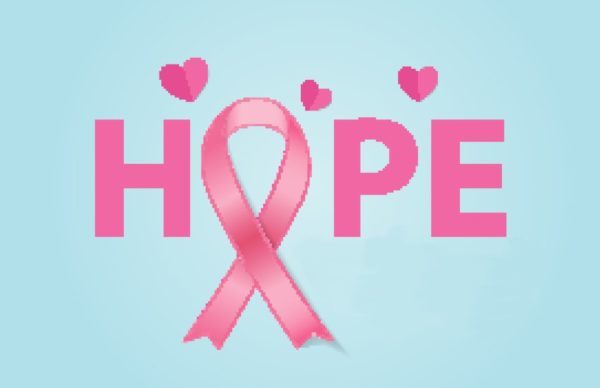Since most types of breast cancer are stimulated by estrogen, many women take an anti-estrogen medicine to prevent breast cancer, either to treat it directly or to help prevent it from coming back.
There are two types of anti-estrogen medicines: estrogen blocking agents and estrogen production inhibitors. Tamoxifen (Nolvadex®) is an estrogen blocker that works by preventing estrogen from binding to breast tissue. Tamoxifen is used either in combination with other medicines in treating breast cancer and by itself to prevent breast cancer in high-risk women.
Another type of anti-estrogen medicine works by reducing estrogen production inside the body. Less estrogen means less potential to stimulate any cancer cells lurking in breast tissue.
In postmenopausal women, a special enzyme called aromatase is responsible for creating estrogen, and medicines that interfere with it are called aromatase inhibitors. Aromatase inhibitors like anastrozole (Arimidex®) and letrozole (Femara®) are often prescribed for 5 years or more after initial treatment of breast cancer to decrease the risk of recurrence.
The most common adverse effects from anti-estrogen medicines are fatigue, weight gain, dry skin and hair, vaginal dryness and discomfort, hot flashes or night sweats, and aching muscles or joints.
One way to combat dry skin and hair is to eat a “good fat” diet with olive oil like in the Mediterranean diet or coconut oil in place of vegetable oil or butter. I’m not a fan of the taste of olive oil, so I use avocado oil instead. The tall glass bottle of avocado oil sold by Costco is a great value.
Hot flashes and night sweats are common side effects from taking tamoxifen or aromatase inhibitors. Unfortunately, the hot flashes you get from these medicines don’t seem to be relieved as easily by drinking soy milk or taking supplements containing black cohosh like Remifemin® or red clover.
In fact, Remifemin® and other herbal products sold for menopausal symptoms can act just like estrogen in breast tissue, which is exactly what you should avoid if you have breast cancer. Fortunately, there are prescription medicines that can provide some relief, like anti-depressants venlafaxine and citalopram, as well as gabapentin, a medicine used for preventing seizures and relieving nerve pain.
Nearly half of women who take an aromatase inhibitor will experience aching muscles or painful joints. Glucosamine may offer relief, has no significant side effects, and can also be added to other medicines without causing problems. I recommend using glucosamine powder because it is less expensive and better absorbed than taking the pill form. Allow 4-6 weeks of taking glucosamine to see the full effect before deciding if it’s helping you.
Another option for aches and pains is Tylenol Arthritis® Extended Relief, which lasts twice as long as Tylenol® Extra Strength. Try taking two of the 650mg tablets twice daily every day for at least a week to see if it helps you.
Other options for muscles aches include anti-inflammatories like ibuprofen (Motrin-IB), naproxen (Aleve®) and fish oil capsules. If you are also taking a blood thinner like aspirin, Coumadin® or warfarin, Xarelto®, Eliquis® or Pradaxa®, talk to your doctor before starting these pain medicines, because they can increase your risk of bleeding.
Cannabidiol extracts (CBDs) are made from hemp oil; they contain little to none of the mild-altering compound THC and may provide relief of muscle or joint pain without risking testing positive for THC or impairing your ability to drive a car safely.
If these don’t help, you should talk to your doctor about your symptoms. Sometimes just switching to a slightly different medicine can make all the difference, as every person is different in how a particular medicine affects them.
Here are 5 Tips for Living with Anti-Estrogen Medicines:
- Eat good fats.
To help relieve dry skin and hair, switch from a low fat to a “good fat” diet, like the Mediterranean diet. “Good fats” include coconut, avocado, and olive oil. Fish oil supplements can also help ease symptoms of dry hair and skin.
- Avoid soy and menopause relief products.
For hot flashes and night sweats, talk to your cancer doctor about prescription medicines like the anti-depressants venlafaxine or citalopram, or the anti-seizure medicine gabapentin. Avoid taking concentrated soy products or herbal supplements marketed for menopausal symptoms. Although much weaker than prescription-strength estrogen, these alternatives have similar effects on breast tissue and should be avoided by women at risk for breast cancer.
- Stay active.
Keep yourself as physically active as possible. Regular physical activity discourages weight gain, boosts your mood and may reduce the muscle aches and joint pain experienced by nearly half of women who take an aromatase inhibitor like anastrozole or letrozole.
- Expect some soreness.
If you notice that your muscles or joints ache, don’t blame old age; it may be your medicine. Since most women will need years of anti-estrogen medicine, don’t stop it on your own. Try something to ease the ache instead: glucosamine powder, Tylenol® Arthritis (650mg tablets), Aleve® (naproxen), Motrin-IB (ibuprofen), fish oil capsules or even CBD elixir may help enough to get you through.
- Don’t suffer in silence.
If trying several non-prescription pain relievers doesn’t help muscle or joint aches enough to keep you physically active, please talk to your doctor. You may be able to switch to a similar medicine for breast cancer prevention that causes less side effects for you.


